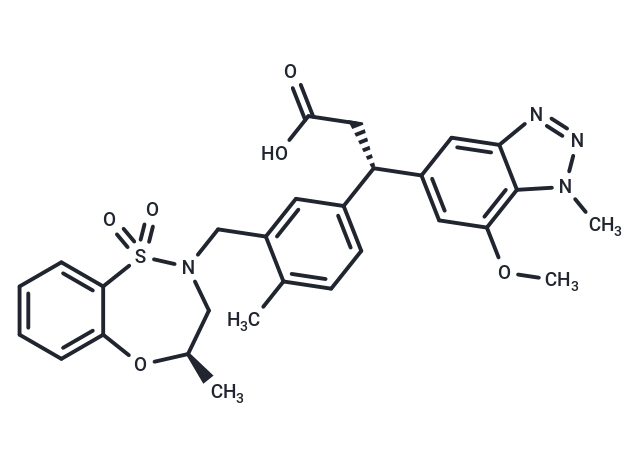Shopping Cart
Remove All Your shopping cart is currently empty
Your shopping cart is currently empty
KI696 is a high-affinity probe that potently inhibits the interaction of Keap1 and NRF2.

| Pack Size | Price | USA Warehouse | Global Warehouse | Quantity |
|---|---|---|---|---|
| 1 mg | $147 | In Stock | In Stock | |
| 5 mg | $313 | In Stock | In Stock | |
| 10 mg | $469 | In Stock | In Stock | |
| 25 mg | $786 | In Stock | In Stock | |
| 50 mg | $1,130 | In Stock | In Stock | |
| 100 mg | $1,630 | - | In Stock | |
| 200 mg | $2,180 | - | In Stock | |
| 1 mL x 10 mM (in DMSO) | $379 | In Stock | In Stock |
| Description | KI696 is a high-affinity probe that potently inhibits the interaction of Keap1 and NRF2. |
| In vitro | KI696 displays high affinity for the KEAP1 Kelch domain with ITC Kd of 1.3 nM with the exception of the organic anion transporting polypeptide 1B1, the bile salt export pump BSEP and the phosphodiesterase PDE3A with an IC50 of 2.5 µM, 4.0 µM and 10 µM). KI696 causes an increase of NRF2 Nuclear Translocation in Normal Human Bronchial Epithelial cells and mRNA expression of the NRF2-dependent genes NQO1 and GCLM in NHBE cells transfected with the non-targeting siRNA in an NRF2-dependent manner[1]. |
| In vivo | KI696 induces the expression of the Nqo1, Ho-1, Txnrd1, Srxn1, Gsta3, and Gclc genes in a dose-dependent manner with EC50s of 44.0, 25.7, 42.6, 33.8, 28.4, and 44.1 µmol/kg, respectively. KI696 attenuates ozone-Induced pulmonary inflammation and restores depletion of lung GSH levels. In rats, intravenous administration of KI696(10-50 µmol/kg) results in steady state compound concentrations in the blood of 407-1437 nM[1]. |
| Molecular Weight | 550.63 |
| Formula | C28H30N4O6S |
| Cas No. | 1799974-70-1 |
| Smiles | COc1cc(cc2nnn(C)c12)[C@@H](CC(O)=O)c1ccc(C)c(CN2C[C@@H](C)Oc3ccccc3S2(=O)=O)c1 |
| Relative Density. | 1.39 g/cm3 (Predicted) |
| Storage | Powder: -20°C for 3 years | In solvent: -80°C for 1 year | Shipping with blue ice/Shipping at ambient temperature. | |||||||||||||||||||||||||||||||||||
| Solubility Information | DMSO: 150 mg/mL (272.42 mM), Sonication is recommended. | |||||||||||||||||||||||||||||||||||
| In Vivo Formulation | 10% DMSO+90% Corn Oil: 2 mg/mL (3.63 mM), Sonication is recommeded. Please add the solvents sequentially, clarifying the solution as much as possible before adding the next one. Dissolve by heating and/or sonication if necessary. Working solution is recommended to be prepared and used immediately. The formulation provided above is for reference purposes only. In vivo formulations may vary and should be modified based on specific experimental conditions. | |||||||||||||||||||||||||||||||||||
Solution Preparation Table | ||||||||||||||||||||||||||||||||||||
DMSO
| ||||||||||||||||||||||||||||||||||||
| Size | Quantity | Unit Price | Amount | Operation |
|---|

Copyright © 2015-2025 TargetMol Chemicals Inc. All Rights Reserved.